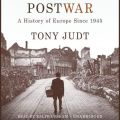 Persistently Postwar
Persistently Postwar
Автор: Группа авторов
Год издания: 0000
From melodramas to experimental documentaries to anime , mass media in Japan constitute a key site in which the nation’s social memory is articulated, disseminated, and contested. Through a series of stimulating case studies, this volume examines the political and cultural representations of Japan’s past, showing how they have reinforced personal and collective narratives while also formulating new cultural meanings, both on a local scale and in the context of transnational media production and consumption. Drawing upon diverse disciplinary insights and methodologies, these studies collectively offer a nuanced account in which mass media function as much more than a simple ideological tool.
 Reading Postwar British and Irish Poetry
Reading Postwar British and Irish Poetry
Автор: Thurston Michael
Год издания:
Combining detailed explorations of both mainstream and experimental poets with a clear historical and literary overview, Reading Postwar British and Irish Poetry offers readers at all levels an ideal guide to the rich body of poetic works published in Britain and Ireland over the last half-century. Features detailed discussions of individual poems that are widely available in anthologies and selected poems volumes Pays explicit attention to how to read the poems, focusing on language and form and the institutional conditions of literary possibility in which poets worked Includes poets of all types and styles from throughout the post-war period, including canonical and mainstream poets alongside experimental poets, women, and poets of color
 Postwar
Postwar
Автор: Tony Judt
Год издания:
 A Concise Companion to Postwar American Literature and Culture
A Concise Companion to Postwar American Literature and Culture
Автор: Группа авторов
Год издания:
This Concise Companion is a guide to the creative output of the United States in the postwar period, in its diverse energies, shapes and forms. Embraces diversity, covering Vietnam literature, gay and lesbian literature, American Jewish fiction, Italian American literature, Irish American writing, emergent ethnic literatures, African American writing, jazz, film, drama and more. Shows how different genres and approaches opened up creative possibilities and interacted in the postwar period. Portrays the postwar United States split by differences of wealth and position, by ethnicity and race, and by agendas of left and right, but united in the intensity of its creative drive.
 A Concise Companion to Postwar British and Irish Poetry
A Concise Companion to Postwar British and Irish Poetry
Автор: Nigel Alderman
Год издания:
This volume introduces students to the most important figures, movements and trends in post-war British and Irish poetry. An historical overview and critical introduction to the poetry published in Britain and Ireland over the last half-century Introduces students to figures including Philip Larkin, Ted Hughes, Seamus Heaney, and Andrew Motion Takes an integrative approach, emphasizing the complex negotiations between the British and Irish poetic traditions, and pulling together competing tendencies and positions Written by critics from Britain, Ireland, and the United States Includes suggestions for further reading and a chronology, detailing the most important writers, volumes and events
 Postwar
Postwar
Автор: Laura McEnaney
Год издания:
When World War II ended, Americans celebrated a military victory abroad, but the meaning of peace at home was yet to be defined. From roughly 1943 onward, building a postwar society became the new national project, and every interest group involved in the war effort—from business leaders to working-class renters—held different visions for the war's aftermath. In Postwar , Laura McEnaney plumbs the depths of this period to explore exactly what peace meant to a broad swath of civilians, including apartment dwellers, single women and housewives, newly freed Japanese American internees, African American migrants, and returning veterans. In her fine-grained social history of postwar Chicago, McEnaney puts ordinary working-class people at the center of her investigation. What she finds is a working-class war liberalism—a conviction that the wartime state had taken things from people, and that the postwar era was about reclaiming those things with the state's help. McEnaney examines vernacular understandings of the state, exploring how people perceived and experienced government in their lives. For Chicago's working-class residents, the state was not clearly delineated. The local offices of federal agencies, along with organizations such as the Travelers Aid Society and other neighborhood welfare groups, all became what she calls the state in the neighborhood, an extension of government to serve an urban working class recovering from war. Just as they had made war, the urban working class had to make peace, and their requests for help, large and small, constituted early dialogues about the role of the state during peacetime. Postwar examines peace as its own complex historical process, a passage from conflict to postconflict that contained human struggles and policy dilemmas that would shape later decades as fatefully as had the war.